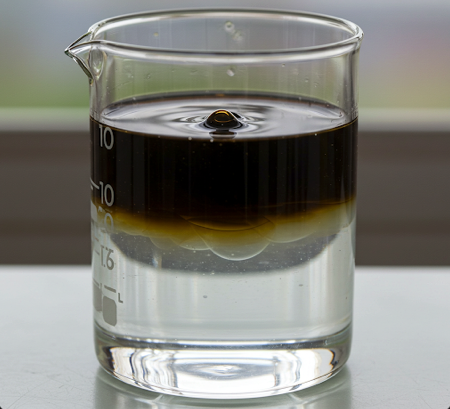API Gravity Formula
- Using this equation, an oil with a specific gravity of 1.0 would have an API Gravity of (141.5 1.0) -131.5 = 10.0 degrees API.
|
|
\( API_{gravity} \;=\; \dfrac{ 141.5 }{ SG } - 131.5 \) (API Gravity)
\( SG \;=\; \dfrac{ 1 }{ \dfrac{ 1 }{ API_{gravity} + 131.5 } }\)
|
| Symbol |
English |
Metric |
| \( API_{gravity} \) = API Gravity |
\( deg \) |
\(deg\) |
| \( SG \) = Specific Gravity |
\( dimensionless \) |
\( dimensionless \) |

API gravity, or the American Petroleum Institute gravity, is a measure of how heavy or light a petroleum liquid is compared to water. It is an important factor in the oil and gas industry for classifying and characterizing crude oils. The API gravity scale is an inverse scale, meaning that higher API gravity values indicate lighter substances. API gravity is thus a measure of the relative density of a petroleum liquid and the density of water, but it is used to compare the relative densities of petroleum liquids. Understanding the API gravity of crude oil is crucial for various industry activities, from exploration and production to refining and marketing. It helps determine the quality and market value of crude oils and influences decisions about extraction, transportation, and refining processes.
Key Points about API Gravity
Light and Heavy Crude Oils - Crude oils with high API gravity are considered "light," indicating that they are less dense than water.
Light crude oils typically contain higher proportions of light
hydrocarbons like gasoline and are easier to refine into valuable products. On the other hand, crude oils with low API gravity are considered "heavy" and contain higher proportions of heavy hydrocarbons, making them more challenging and costly to refine.
Transportation and Refining - API gravity is important for both the transportation and refining of crude oil. Lighter crude oils are often more desirable because they yield a higher percentage of valuable products, such as gasoline and diesel, during the refining process. Lighter oils also tend to be easier to transport through pipelines.
Benchmark Grades - Different regions produce crude oils with varying API gravity. For example, West Texas Intermediate (WTI) is a light crude oil with a high API gravity, while Canadian oil sands produce
heavy crude oil with a lower API gravity. Benchmark crude oils are often used to establish pricing in the global oil market.
API Gravity Ranges - API gravity is typically measured on a scale from 0 to 100. Crude oils with API gravity greater than 10 are lighter and float on water, while those with API gravity less than 10 are heavier and sink. Most crude oils fall in the API gravity range of 10 to 70.
API Gravity Ranges
Light Crude Oil (above \(31.1^{\circ}\)) - Low density, flows easily, high yield of gasoline and light hydrocarbons.
Medium Crude Oil (\(22.3^{\circ}\) to \(31.1^{\circ}\)) - Moderately dense, less fluid than light oils, still economically viable for refining.
Heavy Crude Oil (\(10^{\circ}\) to \(22.3^{\circ}\)) - High density, viscous, requires more processing to refine.
Extra Heavy Crude Oil (below \(10^{\circ}\)) - Extremely dense and viscous, often sinks in water, includes bitumen and tar-like substances.



